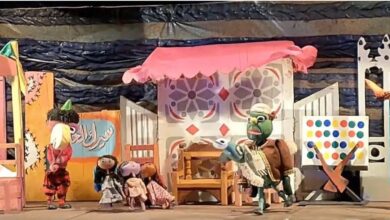In Egypt, Ramadan is more than a holy month of fasting; it is a month for stories and elaborate festivities. Gathering around televisions and radios, and feasting with friends and family, are without a doubt integral parts of Egyptian Ramadan.
This year, Egyptian radio produced over 20 dramas, featuring an unprecedented number of stars from both the big and small screen.
According to the state-owned broadcast magazine, the highest paid actor was Somaya al-Khashab, who stars in the Al-Sharq al-Awsat channel’s Ayam Gamila (Beautiful Days). The show was written by Ayman Salama, a renown TV writer, and directed by Aly Moselhy, who is also well-known in the TV world.
Married stars Ahmed Helmy and Mona Zaki assume lead roles in Al-Sharq al-Awsat’s Ya Ana Ya Enta (It’ll Be Either Me or You), for which they earned a combined LE1 million. Sponsored by Mobinil, the show features a catchy theme song and is a charming representation of a bickering modern couple.
Two other Egyptian celebrities, Ahmed al-Sakka and Ghada Adel, star in the radio show Alashan Khater Masr (For Egypt’s Sake), along with a number of actors and singers such as Hamada Helal and Ingy Aly.
The episodes narrate stories about Egypt’s culture. Al-Sakka is witty, and his signature voice draws much attention to the show. However, the drama is not merely dedicated to the celebration of Egypt; humorous criticisms are woven into the dialogue, providing a more realistic portrait of the country.
Talk shows are also very popular on Egyptian radio. The Al-Sharq al-Awsat station broadcasts Maana al-Fetar (Together for Iftar), presented by network president Amr Abdel Hameed. For three hours before and after iftar, Abdel Hameed discusses both professional and personal issues with guests such as Mohammed Heneidy, Somaya al-Khachab, Mervat Amin, Hend Sabry, and Fathy Abdel Wahab.
This show is punctuated by bursts of laughter. The host asks creative and stirring questions such as, “Does perfection have a place in our world today?” along with questions about a guest’s private life and career. The charismatic Abdel Hameed elicits thought and reflection from each guest.
Egyptians all over the world can experience the spirit of the holy month by accessing the radio programs online. Al-Bernameg al-Aam station, which broadcasts live from Egypt, will really give them a taste of home.
Also on Al-Sharq al-Awsat is the entertaining Sahm al-Zatoon Telee (The Olive Stocks Are Up) starring celebrities Mohammed Heneidy and Hend Sabry. This drama tells the story of a supermarket owner (played by the comedian Heneidy). His cousin (Sabry) has just received a degree in economics from a university in London, and she tries to help him apply the principles of economics to advance his business. Broadcast just before 6PM, fans can listen to this show while driving to iftar at a family member’s house or putting the finishing touches on a home cooked meal.
The radio offers practical advice in addition to entertainment. Regarding health and nutrition, kidney patients, for example, will find announcers reminding them to drink a lot of water after iftar to compensate for their lack of water consumption during the day’s fast. A countdown to iftar is announced at regular intervals, helping the faster survive the wait.
Radio contests are also very common. They include Al-Kahera al-Kobra’s Protectors of the Environment, in association with the Ministry of Environmental Affairs, which offers a LE100 reward daily for winners. Al-Kahera al-Kobra also broadcasts talk shows which host show business personnel such as Hady al-Gayyar.
Advertisements for Mobinil, fighting drug addiction, and Sakkara cement appear on the radio featuring the same jingles as they do on television. But, unlike the endless string of boisterous TV ads, radio spots are short and snappy, aiming to send a succinct message.
Also on Al-Sharq al-Awsat, actor Talaat Zakaria presents a short satire, turning issues that matter to Egyptians, such as a deadly haze of pollution called the black cloud, into black comedy.
On Sawt al-Arab, a range of programs are available including Shereet Men Zaman (A Tape from the Past), which broadcasts old radio shows. Layaly Sawt al-Arab (Sawt al-Arab Nights) broadcasts at midnight, featuring songs from past concerts by singers such as Sabah or the more contemporary Angham.
This station also broadcasts talk shows, such as the post-iftar show Faqat wa Hasreyan (Exclusively). Another post-iftar show features guests discussing their favorite Ramadan dishes.
For religious programming, tune into Al-Quran al-Karim. Allahom Inny Sayem (God, I Am Fasting) hosts professors of Islamic philosophy and other experts, who discuss what is appropriate Islamic behavior in many settings, such as following traffic rules.
Other programs on Al-Quran al-Karim include Al-Quran wa Qadaya al-Asr (Quran and Contemporary Issues), where matters such as fasting and dealing with anger and gossip are discussed. The program Al-Osra wa al-Mogtamaa (Family and Society) is also featured on this station.
Musical choices also vary during Ramadan. As many people prefer not to listen to the regular loud and frantic music during the holy month, Nogoom FM offers more appropriate alternatives, broadcasting religious singles by Sami Yusuf and similarly spiritual artists.




